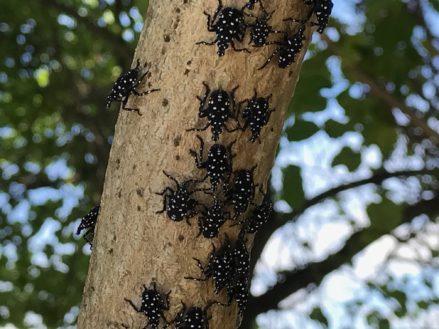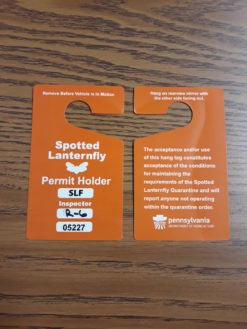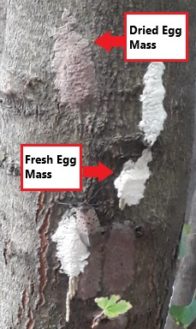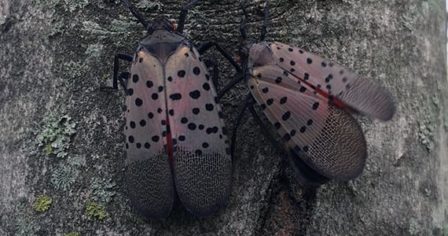For those of you unfamiliar with the Spotted Lanternfly, you can read more about it here. The Spotted Lanternfly quarantine now includes Dauphin County.
According to the Pennsylvania Department of Agriculture (PDA), Dauphin County is now part of the Spotted Lanternfly quarantine zone. Let’s take a quick look at what this means for businesses and homeowners in Dauphin County.
Impact on Businesses
If you operate a business in Dauphin County that has commercial vehicles (company cars, service trucks, etc.), the quarantine applies to you.
 Businesses that operate company vehicles inside the quarantine zone are required to register with the Department of Agriculture for quarantine compliance. Basically, this involves someone from the business or organization passing a test on how to inspect for Spotted Lanternfly adults, nymphs, and eggs.
Businesses that operate company vehicles inside the quarantine zone are required to register with the Department of Agriculture for quarantine compliance. Basically, this involves someone from the business or organization passing a test on how to inspect for Spotted Lanternfly adults, nymphs, and eggs.
Once that training is complete, the individual in the organization that passed the exam is required to organize a training for the rest of the business to ensure compliance. Once completed, you receive orange placards that you must display from your rearview mirror. These placards indicate that you’ve inspected your vehicle to ensure you’re not transporting any Spotted Lanternfly adults, nymphs, or eggs.
It sounds pretty onerous and time-consuming, but it’s really not that much of a burden. Once you know what to look for and how to do a quick inspection, it goes pretty quickly.
Final note: this applies to ALL businesses operating commercial vehicles inside quarantine zone. This isn’t just something landscapers and lawn care companies are responsible for. Plumbers, carpenters, roofers, you name it – if you’re operating a vehicle with a business name on it, you’re responsible for understanding the quarantine, and displaying a placard.
You can find more information about permit requirements here.
Homeowner Responsibility
Homeowners have some responsibility in this, too.
Spotted Lanternfly nymphs aren’t the brightest. They’ll congregate in huge numbers in seemingly random places. I’ve seen a picture of thousands of stage 4 nymphs (the black and red ones, right before they reach adulthood) on the tires of a wheeled bulldozer.
This makes a homeowner’s role in slowing the spread of this pest even more important. The PDA has compiled a checklist of things that homeowners should inspect prior to travelling. The checklist includes:
- Campers, RV’s, and Motor Homes
- Tents and tarps
- Firewood and lumber stored outside
- Propane or oil tanks
- Barbecue grills
- Outdoor furniture
- Bricks, pavers, and cinder blocks
- Dog houses, chicken coops, and storage sheds
- Yard decorations and garden tools, including lawn mowers
- Yard debris
- Trees, shrubs, and other plants, especially if purchased in the quarantine zone
- Kiddie pools and play houses
- Bicycles, scooters, etc.
- Old pallets
As you can see, there’s a lot of stuff to check out. The adult stage, when they’re mating later in the season, will lay their eggs on any and all of these items.
Also, if you live outside the quarantine zone, please continue to report sightings of the Spotted Lanternfly. This helps Penn State and the Department of Agriculture keep track of how quickly it is spreading, and expand the quarantine zone if needed. You can use this site to report a sighting. Click here to see if your county is currently under the quarantine.
Why is this important for me?
 There’s lots of reasons this impacts us here Lancaster, Dauphin, York, and Lebanon Counties. The economic impact of this pest alone is potentially catastrophic.
There’s lots of reasons this impacts us here Lancaster, Dauphin, York, and Lebanon Counties. The economic impact of this pest alone is potentially catastrophic.
Spotted Lanternfly is currently feeding on plants with a high sugar content in the sap. According to researchers at Penn State, Pennsylvania is the number one exporter of hardwoods (like maple) in the United States. We’re number four in the nation in apple and peach production, and fifth in the country in grape production. We haven’t even mentioned the landscape and nursery industry. These are all targets for the Spotted Lanternfly to feed on.
The current value of these commodities that will potentially be impacted is staggering. The value of the three fruit crops mentioned above is about 134 million dollars of the current Pennsylvania economy. The landscape and nursery stock would mean potential damage to over 940 million dollars in commerce here in the Commonwealth. The damage to hardwood production is potentially devastating – Pennsylvania currently earns almost 17 billion dollars from hardwoods each year.
The potential disruption of nearly 17.8 billion dollars in revenue in the State’s economy impacts us all.
In addition, there’s the potential for this pest to drag down property values, disrupt tourism, and damage our native ecosystem. It doesn’t have a natural predator here in North America (being native to Asia), so there’s no real way to calculate the havoc it might wreak with our native plant and insect balance.
Keep checking in with us regularly for updates on the Spotted Lanternfly as they become available. If you have concerns about the potential damage to your landscape, feel free to Contact Us for a free consultation. We’re happy to talk to you about a tailored management plan for your property.

